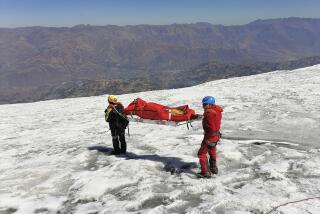Not Just Because It’s There
- Share via
Thirty-two years ago Edmund Hillary and Tenzing Norgay became the first people to stand on the top of the world, the 29,028-foot summit of Mt. Everest. Nearly 40 expeditions and more than 100 individuals have gone to the summit by a variety of routes from both the Chinese and Nepalese flanks.
Americans have forged some of the bolder Everest climbs, including the West Ridge in 1963 and the brooding Kangshung Face in 1983. Reinhold Messner of Italy dared to prove that Everest could be climbed without artificial oxygen. He returned later to do it solo.
The Hillary-Norgay route now is known as the normal or standard route up Everest. But climbing this peak of ice, snow, wind and cold still is no Sunday stroll, even for the fittest young athlete. Thus, Tuesday’s ascent by 55-year-old Richard D. Bass deserves special attention.
Bass is the oldest person to reach the summit. He is an executive who has had enough corporate-world adventures to satisfy most egos. Yet a man who had everything to lose--through an avalanche or the random toppling of an ice tower in the Khumbu icefall--risked it all to pursue a goal that begets nothing of tangible value. Man’s marks on the summit of Everest are singularly perishable.
Bass and Frank G. Wells, his former partner, took up serious climbing of big mountains at an age when most men start to figure their retirement benefits and view the future as the gentle downslope of life. Wells gave up his presidency of Warner Communications to join Bass in their “crazy dream” of climbing the highest summits of the world’s seven continents, a dream consummated by Bass on Tuesday.
So . . . why?
By most measures, climbing a big mountain involves more drudgery than fun. It is costly and time-consuming, and brings loneliness and sometimes grief to loved ones. To say “because it’s there” evades the question.
The answer lies not in fame, riches or even machismo. The best climbers often are shy and introverted persons. They know that they do not conquer mountains. One thoughtful mountaineer once wondered what he had vanquished in reaching a summit. His answer: “None but ourselves.”
There may be as many answers as there are climbers. For some, the words of John Muir provide sufficient justification: “Walk away quietly in any direction and taste the freedom of the mountaineer.”
More to Read
Sign up for The Wild
We’ll help you find the best places to hike, bike and run, as well as the perfect silent spots for meditation and yoga.
You may occasionally receive promotional content from the Los Angeles Times.






